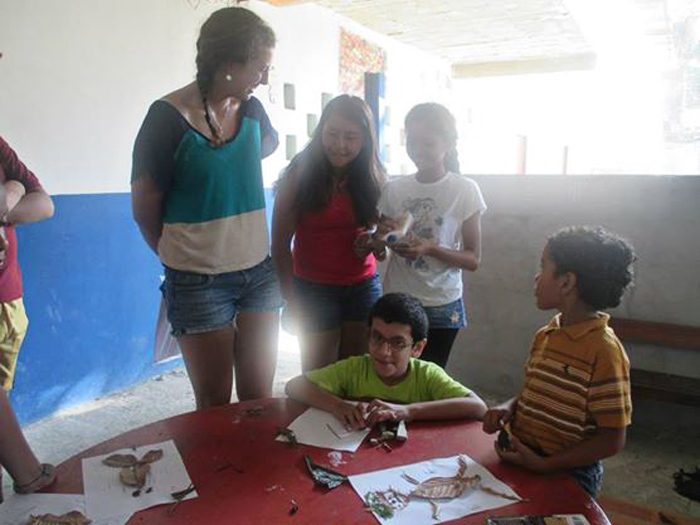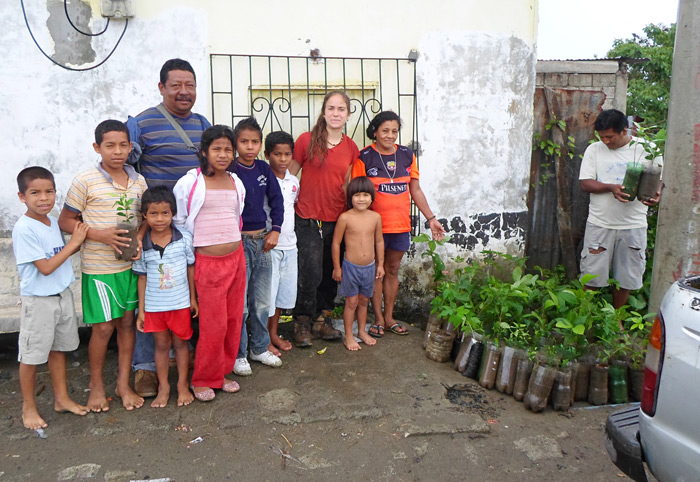When I started working as the Community Engagement Intern at Planet Drum (PD), I was excited to join the team and help out in any way that I could. The first weeks as a Drummer involved working at some of the restoration sites that Planet Drum has been caring for during the past few years, including Bellavista, La Universidad Católica, and Bosque en Medio de las Ruinas. Also, PD worked as part of the campaign to plant fruit trees in the houses of the Bellavista community. This project was a great way to get involved with the community – I met many of the kids who later came out to the greenhouse to learn about our work and help transplant trees.
One of the struggles of volunteering in a foreign country is that local people are not always invested in the project and may not see the purpose of the work. In PD’s case, locals might simply see the foundation as a bunch of gringos running around planting trees. Although regeneration of the landscape is the main goal for PD, it should be achieved by effectively involving the locals. As the Community Engagement Intern, my plan was to focus on connecting PD’s Revegetation Project with regional schools and involving students from all over Bahía.
Last year, Planet Drum began inviting groups of school children to the greenhouse to participate in Revegetation Workshops. It was a great success for both the students and the organization. My goal, as determined with PD Ecuador Program Director Clay Plager-Unger, was to visit as many of the local schools as I could during the rainy season vacation and invite them to work with us at our greenhouse. By setting up this relationship before the school year started in May, we hoped to receive numerous groups of students from a variety of local area schools while school was in session. Each visit begins with a lesson on bioregionalism and regeneration of native plants. Then students take a short tour of the greenhouse. Finally, they have the opportunity to do some transplanting. At the end of the visit, each student has the option to take home a fruit tree of their choice to plant at their house.
After a few weeks of working with the other PD volunteers to become more familiar with the project and Bahíá, I started to make contact with many of the schools in the area. I went around to each school asking to speak with their director and explaining our project. Most importantly, we wanted to offer a program that was mutually beneficial. PD would give natural science lessons, while they would help us produce more trees. I explained what the program would involve and summarized how PD already has worked with a couple of schools. I was excited to hear that each of the schools I visited wanted to work with us. Each of the directors had slightly different ideas for how we could work with their school; by talking with them I was able to understand how we could be most helpful for each distinct community. One of the schools, Alpha y Omega, is a school that is connected to a church – and has a church group that runs year-round. They were the first group of students with whom I had the opportunity to work.

This particular school was very small, and the group consisted of about 20 students, from ages 6 to 15. They were particularly interested in the recycling of organic material and compost production, something that they hoped to put into practice at their school. They asked for PD to give a lesson at their school during one of their weekend meetings, and then planned to visit the greenhouse to participate in PD’s project. Abby, one of the PD volunteers, and I gave a short lesson on the bioregion and the cycles of nature that help to keep our environment healthy. We talked about how important it is that we are a part of the ecosystem. At the end of the lesson, each student made a self-portrait using all natural materials they found in the school grounds, to show how each of us is a part of our bioregion. It was a great success! Later on that week, they visited the greenhouse and seemed to really enjoy themselves.
After a few weeks of talking with school directors, we invited some of the kids from the community of Bellavista to come work with us, too. Since schools were still not in session for the year, we decided to go directly to the neighborhood and invite some of the kids to the greenhouse. They had already planted trees with us in their neighborhood, and still had a few weeks left of vacation before going back to school. I walked up one afternoon with Lexie, another PD volunteer, and we asked them to join us the next day—we’d come get them to take the bus out to the greenhouse. The next morning we found ourselves headed to the greenhouse with 16 kids (and no other adults), for one of the most rewarding and challenging groups of visitors. Despite having serious difficulty staying focused at the task at hand, they had a great time and had lots of energy.

After taking fruit trees to plant at the La Cruz neighborhood, we invited another group of kids to visit the greenhouse. This time, I led the tour of the greenhouse and we talked about the importance of our bioregion and what it really means to care for the environment. One of my favorite things about working with these groups is seeing the kids later in the community. I’ve run into many of the children throughout town, and they’re always excited to see us and greet me with a smile. They’re always eager to update me on the trees that they took home with them from the greenhouse—how often they’ve been watering them, where they planted them, and so on.
Although I will be leaving Bahía shortly, we have successfully scheduled more than 20 student groups to work with PD this year. The students will come and work at the greenhouse, and each one will take a tree home. In this way, PD is not only helping to integrate environmental science into schools, but also boosts greenhouse tree production and distribution, so that each Bahía family can benefit from having new fruit-producing trees at their homes. I’m excited to hear how much Planet Drum can do with the increased community participation!
Ally Mack
Community Engagement Intern March-May, 2014

Reader Interactions